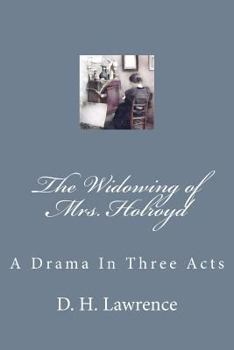The Widowing of Mrs. Holroyd: A Drama In Three Acts
Select Format
Select Condition 
Book Overview
David Herbert Richards Lawrence (1885-1930) was an English writer of the 20th century, whose prolific and diverse output included novels, short stories, poems, plays, essays, travel books,... This description may be from another edition of this product.
Format:Paperback
Language:English
ISBN:1979444153
ISBN13:9781979444156
Release Date:November 2017
Publisher:Createspace Independent Publishing Platform
Length:76 Pages
Weight:0.25 lbs.
Dimensions:0.2" x 6.0" x 9.0"
Customer Reviews
1 rating
This is a riveting play
Published by Thriftbooks.com User , 14 years ago
Lizzie Holroyd lives with her husband Charles in a mining town. Charles works in the mine. Lizzie feels that she is living in hell. Charles is a drunk. He abuses Lizzie, ignores his two children who are afraid of him, spends after work time in bars, consorts with whores who he takes to his house and, while drunk, accuses his wife of adultery because he finds a male in his kitchen, a man who had carried him home from the bar. While his family lacks food, he drinks away chunks of his wages and becomes fat. Lizzie is unable to communicate with him. She has some inherited money, but does not leave him. Although she despises her husband, she cannot understand why she doesn't leave him. D. H. Lawrence, a famous classical author, wrote his play with moving evocative dialogue and drama. A train whistle is heard sometimes in the background, as if to signal that Lizzie should get away. A local man tries to persuade Lizzie to leave her abusive husband. He loves her and wants to take her and her two children to Spain. She fights against abandoning Charles and showing the man emotion, but finally admits she loves him and agrees to leave on Saturday, just a couple of days away. But Charles is killed in a mine accident the next day. Lizzie cries over his dead body that she is being punished for wanting to leave him. She wanders if Charles caused his own death because she failed to care for him. While washing his corpse, she kisses him and calls out "my dear" again and again. She tells his body, "You couldn't help it my dear, you couldn't help it.... I caused you hurt." The play raises many questions for its audience. Why didn't Lizzie leave Charles? How could Lizzie blame herself for the failed marriage when it is clear that her husband is to blame? Is Lawrence describing a normal wifely emotion when a husband dies? Why did she fight to repress her love for another man who was clearly more suitable as a husband and father to her children?




